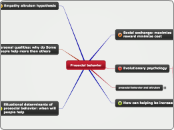by vikash baichoo 12 years ago
866
Prosocial behavior

by vikash baichoo 12 years ago
866

More like this
In general we are more likely to help in a Communal relationship than an exchange relationship except if our self esteem is threatened then we are more likely to help the stranger.
Guilt to cancel bad deeds
not much more likely to help
Any act performed with goal of benefiting another person
Altruism desire to help even if it involves cost to helper